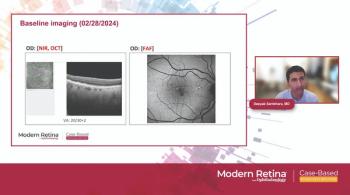
Eye drops could provide a more effective and comfortable therapy for retinal vein occlusion
Eye drops developed by Columbia University researchers could prove to be a more effective and comfortable therapy for retinal vein occlusion (RVO).
According to a study, eye drops developed by Columbia University researchers could prove to be a more effective and comfortable therapy for retinal vein occlusion (RVO).
According to a Columbia University Irving Medical Center (CUIMC) news release, RVO affects up to 2% of people over age 40, occurs when a vein in the eye’s retina becomes blocked, leading to swelling in the eye, inflammation, damage to the retina, and vision loss.
The university noted the standard therapy involves injecting into the eye a vascular endothelial growth factor inhibitor (anti-VEGF) that reduces swelling. The therapy can improve vision but patients with significant retinal damage due to impaired blood flow often have poor outcomes.
In a CUIMC news release, Carol M. Troy, MD, PhD, professor of pathology and cell biology and of neurology at Columbia University Vagelos College of Physicians and Surgeons, highlighted the research.
“Anti-VEGF therapy has helped a lot of people with RVO, but the fear factor—having to get a needle in the eye—causes many people to delay treatment, which can lead to retinal damage,” Troy said in the news release. “There’s an opportunity to help more people with this disease that is a leading cause of blindness worldwide.”
According to the news release, the study detailed the experimental eye drop treatment was twice as effective as the standard injection therapy at reducing swelling and improving blood flow within the retina of mice with RVO. Researchers also found the eye drops also prevented neurons (photoreceptors) in the retina from deteriorating and preserved visual function over time, whereas the standard injections had no effect on either.
In the study,1 adult male C57Bl/6J mice were randomly assigned to introduction of RVO and treatment either with vehicle, intravitreal injection of anti-VEGF antibody, topical administration of a selective capsase-9 inhibitor (Pen1-XBir3), or a combination therapy.
The animals, according to the study, were followed on days 1, 2, and 8 following RVO with fundus retinal imaging, and with optical coherence tomography (OCT) to capture retinal swelling, capillary nonperfusion, which is measured by disorganization of retinal inner layers, hyperreflective foci, and retinal atrophy. Focal electroretinography measurements were performed on day 7. Histology was performed on retinal sections from day 8.
According to the study,1 both VEGF neutralization and caspase-9 inhibition showed significant retinal protection from RVO compared to vehicle treatment arm. Retinal reperfusion of occluded veins was accelerated in eyes receiving caspase-9 inhibitor, but not significantly different from vehicle in the anti-VEGF group.
Moreover, researchers found that retinal edema was suppressed in all of the treatment groups, with an approximately 2-fold greater edema reduction with caspase-9 inhibition when compared to VEGF neutralization. HRF were reduced similarly across all treatment groups compared to vehicle. Retinal detachment was reduced only in eyes treated with caspase-9 inhibitor monotherapy. Caspase-9 inhibition reduced retinal atrophy and preserved ERG response; VEGF neutralization did not prevent neurodegeneration following RVO.
Researchers concluded that caspase-9 inhibition confers stronger neuronal and vascular protection compared to VEGF neutralization in the mouse laser-induced model of RVO.1
Eye drops target "death enzyme"
The UCIMC news release indicated the eye drops contain an experimental drug that blocks caspase-9, an enzyme that triggers cell death, and was found by Troy’s lab to be overactive in blood vessels injured by RVO.
“We think the eye drops improve the health of blood vessels in the retina, which then decreases the toxic signaling that damages the retina’s neurons and leads to vision loss,” Maria I. Avrutsky, PhD, the study’s first author who conducted the research as a postdoc in the Troy lab, said in the news release.
Future studies are aimed at preparing to test the eye drops in human clinical trials and identifying additional therapeutic targets.
“Finding the root cause of RVO is the holy grail, but if we can at least provide better symptomatic relief that doesn’t distress patients, it would be a really good start,” Troy said.
According to the news release, the study was supported by a sponsored research agreement with Opera Therapeutics and grants from the National Institutes of Health (R01NS091333 and T32EY013933) and the Department of Defense Army/Air Force.
The UCIMC release added that Carol Troy and Maria Avrutsky are inventors on patent applications filed by Columbia University related to the therapeutic use of caspase-9 inhibitors. Maria Avrutsky received consulting income from Opera Therapeutics. The other authors report no financial or other conflicts of interest.
Reference
Maria I. Avrutsky, Claire W. Chen, Jacqueline M. Lawson, Scott J. Snipas, Guy S. Salvesen, and Carol M. Troy. Caspase-9 inhibition confers stronger neuronal and vascular protection compared to VEGF neutralization in a mouse model of retinal vein occlusion. Frontiers of Neuroscience. Published June 28, 2023.Volume 17. DOI: https://doi.org/10.3389/fnins.2023.1209527
Newsletter
Keep your retina practice on the forefront—subscribe for expert analysis and emerging trends in retinal disease management.










































